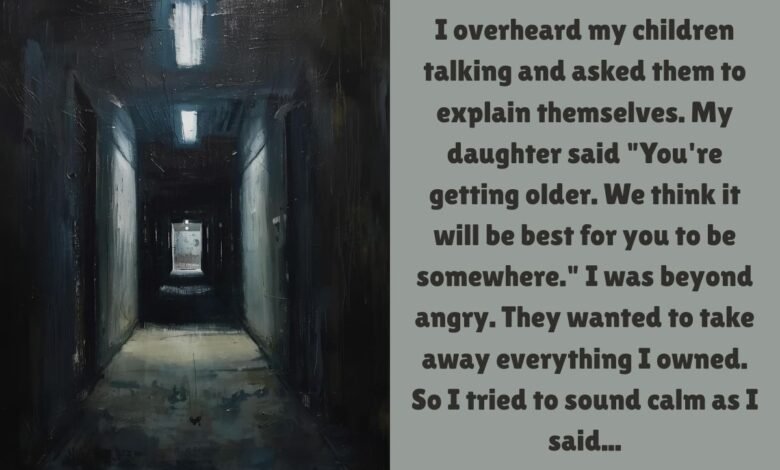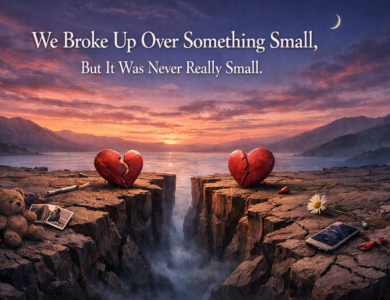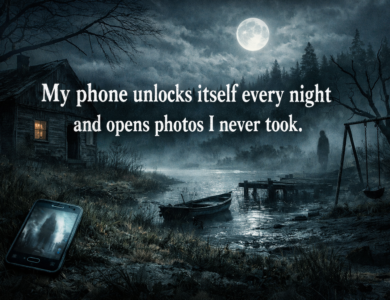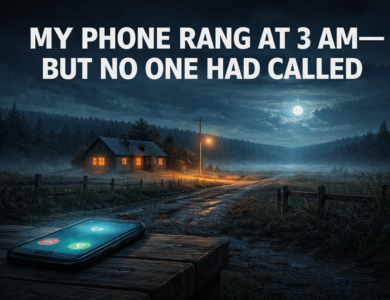
I overheard my children talking and asked them to explain themselves. My daughter said, “You’re getting older. We think it will be best for you to be somewhere.” I was beyond angry. They wanted to take away everything I owned. So I tried to sound calm as I said, “Somewhere like where, exactly? A beach house in Spain or a small apartment with bars on the windows?”
My son shifted uncomfortably in his chair. “Mom, don’t be dramatic. We just think… maybe assisted living would be better. You’d be around people your age. You wouldn’t have to worry about cooking, cleaning—”
“Or privacy? Or freedom?” I snapped.
It went quiet. My daughter looked down at her hands. My son sighed and rubbed the back of his neck like he always did when he felt guilty. I stared at both of them. These were the same children I’d raised with bedtime stories, packed lunches, and handmade Halloween costumes. Now they were plotting to ship me off like an old package no one wants anymore.
“I still drive. I go on walks every morning. I volunteer at the library. I’m not dying. I’m not even limping,” I said, voice shaking.
“It’s not that,” my daughter said softly. “It’s just… after Dad passed, you’ve been alone. We just worry.”
They meant well. I could see that. But it didn’t make it hurt any less.
That night, I barely slept. I walked around my house, touching things like they might vanish soon. The worn armrest on my favorite chair, the picture frames on the mantle, the faint crack in the hallway tile that my husband always meant to fix but never did. Everything felt fragile. Or maybe I did.
The next morning, I did something I hadn’t done in a long time—I wrote in my old journal. The one with the soft leather cover and yellowing pages. I poured it all out. The anger. The fear. The disbelief. And then I wrote something else.
“I won’t wait for them to decide where I belong. I’ll show them.”
That same afternoon, I packed a small bag. Just essentials—some clothes, my journal, and an envelope of cash I had tucked away for emergencies. I left a note on the kitchen table. “Don’t worry. I’m safe. I’ll be in touch. Love, Mom.”
I had no plan. Just a bus ticket to the next town over and the name of a woman I’d met once at the library book club. Her name was Clara. She was in her late sixties, sharp as a tack, and once told me she ran a small hostel for traveling artists.
It felt ridiculous at first. I hadn’t “traveled” in years, unless you count grocery store runs. But when I knocked on Clara’s door and told her I needed a place to stay for a few nights, she didn’t ask questions. She just smiled and said, “Welcome to the artist’s refuge. What’s your medium?”
I paused. “Uh… life?”
She laughed so hard I thought she might choke on her tea.
Over the next few weeks, I settled into a room at Clara’s hostel. The place was old but full of character. Mismatched curtains, creaky stairs, and the smell of lavender and old books in every corner. The other residents were all kinds of odd and lovely. A young man who painted birds. A middle-aged woman who played jazz piano at night. A quiet couple who made pottery in the garage.
I started helping out around the place. Cooking, folding laundry, watering Clara’s herb garden. I even attended a watercolor class once. My flowers looked more like blobs, but no one cared. They cheered anyway.
For the first time in a long time, I didn’t feel like “someone’s mom” or “the widow down the street.” I was just me. And that was enough.
I called my kids once a week. Told them I was fine. I could hear the confusion in their voices. My daughter asked, “Where are you, Mom?”
I told her, “Just living.”
Two months passed.
One morning, Clara handed me a flyer. “They’re doing a community talent night next week. You should sign up.”
I laughed. “What talent? I can make a decent chicken pot pie, does that count?”
“You can write,” she said, nodding at my journal. “You read me that poem the other day. Don’t act like it didn’t move me to tears.”
I had written that poem one evening after dinner. It was about getting older and feeling invisible. About how losing your partner doesn’t mean losing yourself. About rediscovering pieces of you that had been buried under diapers and bills and casseroles for church events.
I didn’t think it was anything special. Just my thoughts, written in a messy scrawl. But Clara insisted. “Write something new. Read it aloud. For you.”
So I did.
That night, I stood on a makeshift stage in the community hall, heart pounding, palms sweaty. The room was full. Locals, travelers, artists. All strangers, yet somehow all familiar. I took a deep breath and began.
The piece was called “Somewhere.” I talked about how people think aging means retreating. How they put you in little boxes, padded and quiet, with plastic flowers and call it safety. But I wanted to be somewhere real. Somewhere messy, with laughter and arguments and paint on the floor. Somewhere with meaning.
I finished. Silence. Then applause. Long, loud, teary applause.
Afterward, a woman came up to me with her teenage daughter. She looked shaken. “My mom lives with us. I think I’ve been doing it all wrong,” she whispered.
Another man hugged me without asking. “Thank you. That felt like my life, right there.”
When I got home to the hostel, there was a voicemail from my son. His voice cracked. “Mom… I just heard your piece. Someone posted it online. It’s everywhere. I… I didn’t know you felt that way. Can we talk?”
It turns out one of the audience members had recorded it and uploaded it. Within three days, the video had a million views.
People from all over sent messages. “You gave me the courage to move out of the home my kids pushed me into.” “You reminded me that I still matter.” “I’m not ready to be boxed away either.”
My daughter called the next day. “Mom,” she said, voice trembling, “I’m sorry. We thought we were helping. But we didn’t ask what you wanted. Can we come visit you?”
They did. Both of them. They brought flowers and fresh pie from my favorite bakery. We sat in Clara’s herb garden. I introduced them to the other artists. We laughed. We cried.
Later, my daughter took my hand. “You don’t have to come back. Not unless you want to.”
“I don’t,” I said honestly. “But I’d like you to come see me more often.”
They agreed.
Weeks passed. Then months.
I started writing more. Stories, poems, reflections. Clara helped me self-publish a small book. “Somewhere: Thoughts From a Woman Who Refused to Be Boxed.” We printed 200 copies. They sold out in a week.
A local radio station invited me to talk. Then a podcast. Then a magazine asked for an interview. Apparently, I was some sort of “later-life rebel icon.”
I didn’t do it for the attention. But I won’t lie—it felt good to be heard.
Clara and I turned one of the hostel’s spare rooms into a writing nook. I spent mornings there with my tea, tapping away on an old laptop someone donated. Afternoons were for walks, visits from friends, or watching the potters shape dreams out of clay.
My kids started visiting every other weekend. My granddaughter came too. She brought drawings and stories and asked me to read mine aloud.
One afternoon, my son brought something wrapped in newspaper. “Found this in Dad’s toolbox. Thought you might want it.”
It was a tiny wooden box, carved by hand. Inside, a note in my late husband’s handwriting. Don’t let them tell you when to stop living. You’ve still got stories to tell, love.
I cried.
Clara cried with me.
The biggest surprise came a few weeks later. A woman knocked on the hostel door. She was in her seventies, elegant, with a no-nonsense expression. “I saw your video,” she said. “Packed a bag the next day. I left the place my kids stuck me in. I want to help here. Cook, clean, whatever. Just… let me be somewhere real.”
We let her in.
Others followed. Not in droves, but in little ripples. People who had been told they were “too old,” “too fragile,” “too much work.” People who still had fire in their bones and stories in their hearts.
We started calling the place “Somewhere.”
A place for anyone tired of being tucked away.
A place to matter.
One year later, we hosted our own festival. Art, music, stories. Every performer was over 60. Every chair was filled. Local kids came too. One of them painted a mural on the side of the building.
It read, You’re never too old to be somewhere that matters.
And I guess that’s the lesson.
Sometimes, the world tries to shrink you down, tell you you’ve had your turn. But you’re not done. Not unless you decide you are.
Don’t let them put you in a corner.
You’ve still got stories. Still got fire. Still got purpose.
Be somewhere loud. Somewhere honest. Somewhere beautiful.
Be somewhere that feels like you.
If this story touched your heart, share it. Let someone out there know it’s never too late to start again.
And if you’re reading this wondering whether to take that step—do it. Pack that bag. Write that story. Be somewhere that matters.
Like, comment, and pass it on.
You never know who needs to hear this today.
Read More: The Promotion That Taught Everyone A Lesson







